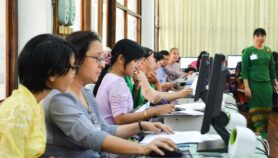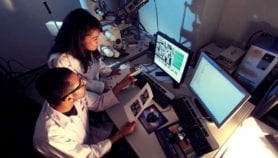By: David Dickson
Send to a friend
The details you provide on this page will not be used to send unsolicited email, and will not be sold to a 3rd party. See privacy policy.
Information technology can help boost the effectiveness of scientists working in relatively isolated environments, the World Summit on the Information Society (WSIS) was told last week.
One of the benefits offered by information and communication technologies (ICTs) to the scientific community is the support that they can provide to researchers working away from the scientific mainstream.
"The scientific community has a long tradition of global collaboration, " Luciano Maiani, the director-general of the European Organisation for Nuclear Research, told the final plenary session of the WSIS in Geneva on Friday (12 December).
"The future development of ICTs will empower scientists not previously prominent in scientific research who nevertheless have valuable human resources, as well as original perspectives on many of the fundamental problems that face humankind," he said.
Maiani was presenting the main conclusions of a meeting on the role of science in the information society held at CERN earlier in the week, organised jointly with the International Council for Science and the Third World Academy of Sciences (see World summit urged to make science more available).
He told those attending the summit that, in addition to the ability to remove the isolation of scientists working in under-resourced environments, there were three other reasons that the CERN meeting had felt it important that the voice of the scientific community should be heard at WSIS.
"Firstly, it was basic science that made possible the technologies underlying the information society," said Maiani. Secondly, the needs of the scientific community had often driven new developments in information technology, such as the Internet and the World Wide Web.
The third reason, he added, was that scientific research would continue to underpin the future development of the information society. This included the development of computing "grids", which he later gave as an example of "new and affordable technologies [needed] to overcome the digital divide".
A number of general themes had emerged during the meeting at CERN as guidelines to future policy, said Maiani. These included recognition that fundamental scientific information "must be made freely available"; software tools for disseminating this information must also be made freely available; networking infrastructure must be established worldwide; and equipment and training were needed to make this possible.
Maiani said that several of the objectives defined at the meeting were already explicitly recognised in both the Declaration of Principles and the Plan of Action being adopted by the WSIS.
"We support these documents," he said. "We scientists are committed to implementing the action plan, and achieving progress by the time of the next meeting in Tunis in 2005."
Link to SciDev.Net's special section on Open Access and Scientific Publishing













